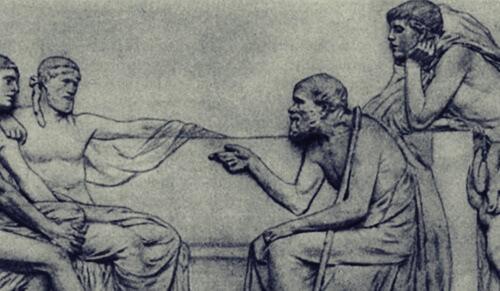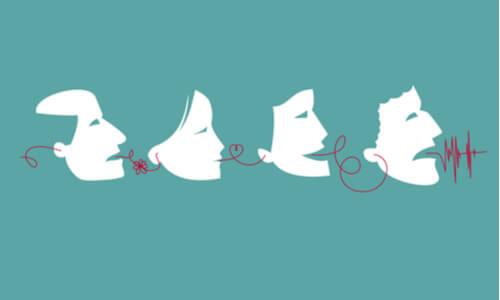Socrates' Triple Filter Test

The triple filter test refers to an anecdote of the great Greek philosopher, Socrates. Many consider this anecdote a great life lesson that can help you deal with gossip and rumors.
This story tells that, one day, one of Socrates’ disciples was quite agitated. He told Socrates that he had met one of Socrates’ friends and that he had spoken badly of him.
Socrates asked the man to calm down. After thinking for a moment, he asked him to wait a minute. Before listening to what he had to say, the message had to go through a triple filter test. If the message didn’t pass the test, it wasn’t worthy of being heard.
“To find yourself, think for yourself.”
-Socrates-

Socrates’ triple filter test
As he always did, the Greek philosopher asked his anxious disciple a question: “Are you absolutely sure that what you’re going to tell me is true?” The disciple thought for a moment. In fact, he couldn’t be sure if what his friend had told him was actually malicious. It was a matter of perspective. “So you do not know if everything he said about me is true or not,” said the philosopher. The disciple had to admit that he didn’t.
Then, Socrates asked him a second question: “Is what you’re going to tell me good or not?” The disciple replied that, evidently, it wasn’t good at all. In fact, it was quite the opposite. He believed that what he was going to share with the philosopher would cause him discomfort and distress. Thus, Socrates said to him: “You’re going to tell me something bad, but you’re not completely sure it’s true”. The disciple admitted that this was the case.
Then, Socrates asked the third and final question: “Is what you have to say about my friend going to help me?” The disciple hesitated. He really didn’t know if that information was useful or not. Maybe it would distance him from his friend, but considering that he wasn’t sure whether it was true or not, maybe it wasn’t useful at all.

Truth, goodness, and usefulness
In the end, the philosopher refused to listen to what his disciple wanted to tell him. “If what you want to tell me isn’t true, isn’t good, and isn’t even useful, why would I want to hear it?” he finally told his disciple.
“I cannot teach anybody anything. I can only make them think.”
-Socrates-
Truth, goodness, and usefulness are the foundation of Socrates’ triple filter test. Socrates thought that a person must ask themselves the following questions before they say anything: “Am I sure that what I am going to say is true?”, “Is what I’m going to say a good thing?”, and “Do I really need to say it and is it useful?”
This triple filter test is an excellent guide, both for what we’re going to say and for what we’re going to listen to. It’s a set of parameters that represent healthy and constructive communication.

How to apply the triple filter test
In everyday life, it’s not easy to define the true, the good, and the necessary. These are abstract concepts that are sometimes difficult to apply. That’s why there are also some additional questions that can help you when it comes to applying the triple filter test:
- Regarding the truth: Do I know for a fact that this information is true? Can I bet on it? Will I be able to prove it to anyone? Am I willing to compromise my reputation over this?
- Regarding the good: Does it benefit me or the other person? Will it make them or me a better person and evoke positive emotions? Will the situation of those involved improve?
- Regarding the necessary or useful: By knowing this message, will that person’s life or my life improve? Can that person take any practical action regarding this information or message? In what way does not knowing this information hurt or affect the other person?
As we pointed out at the beginning, Socrates’ triple filter test is particularly oriented at rumors or gossip. Applying it allows us to put a stop to annoying rumors that sometimes haunt us. However, it’s also valid for other types of messages, such as those we see in social networks.
Before finishing, it is necessary to mention that although this is a quite beautiful story that brings with it a powerful message for our daily lives, there is no historical or bibliographic information that relates the anecdote to the Greek philosopher.
The triple filter test refers to an anecdote of the great Greek philosopher, Socrates. Many consider this anecdote a great life lesson that can help you deal with gossip and rumors.
This story tells that, one day, one of Socrates’ disciples was quite agitated. He told Socrates that he had met one of Socrates’ friends and that he had spoken badly of him.
Socrates asked the man to calm down. After thinking for a moment, he asked him to wait a minute. Before listening to what he had to say, the message had to go through a triple filter test. If the message didn’t pass the test, it wasn’t worthy of being heard.
“To find yourself, think for yourself.”
-Socrates-

Socrates’ triple filter test
As he always did, the Greek philosopher asked his anxious disciple a question: “Are you absolutely sure that what you’re going to tell me is true?” The disciple thought for a moment. In fact, he couldn’t be sure if what his friend had told him was actually malicious. It was a matter of perspective. “So you do not know if everything he said about me is true or not,” said the philosopher. The disciple had to admit that he didn’t.
Then, Socrates asked him a second question: “Is what you’re going to tell me good or not?” The disciple replied that, evidently, it wasn’t good at all. In fact, it was quite the opposite. He believed that what he was going to share with the philosopher would cause him discomfort and distress. Thus, Socrates said to him: “You’re going to tell me something bad, but you’re not completely sure it’s true”. The disciple admitted that this was the case.
Then, Socrates asked the third and final question: “Is what you have to say about my friend going to help me?” The disciple hesitated. He really didn’t know if that information was useful or not. Maybe it would distance him from his friend, but considering that he wasn’t sure whether it was true or not, maybe it wasn’t useful at all.

Truth, goodness, and usefulness
In the end, the philosopher refused to listen to what his disciple wanted to tell him. “If what you want to tell me isn’t true, isn’t good, and isn’t even useful, why would I want to hear it?” he finally told his disciple.
“I cannot teach anybody anything. I can only make them think.”
-Socrates-
Truth, goodness, and usefulness are the foundation of Socrates’ triple filter test. Socrates thought that a person must ask themselves the following questions before they say anything: “Am I sure that what I am going to say is true?”, “Is what I’m going to say a good thing?”, and “Do I really need to say it and is it useful?”
This triple filter test is an excellent guide, both for what we’re going to say and for what we’re going to listen to. It’s a set of parameters that represent healthy and constructive communication.

How to apply the triple filter test
In everyday life, it’s not easy to define the true, the good, and the necessary. These are abstract concepts that are sometimes difficult to apply. That’s why there are also some additional questions that can help you when it comes to applying the triple filter test:
- Regarding the truth: Do I know for a fact that this information is true? Can I bet on it? Will I be able to prove it to anyone? Am I willing to compromise my reputation over this?
- Regarding the good: Does it benefit me or the other person? Will it make them or me a better person and evoke positive emotions? Will the situation of those involved improve?
- Regarding the necessary or useful: By knowing this message, will that person’s life or my life improve? Can that person take any practical action regarding this information or message? In what way does not knowing this information hurt or affect the other person?
As we pointed out at the beginning, Socrates’ triple filter test is particularly oriented at rumors or gossip. Applying it allows us to put a stop to annoying rumors that sometimes haunt us. However, it’s also valid for other types of messages, such as those we see in social networks.
Before finishing, it is necessary to mention that although this is a quite beautiful story that brings with it a powerful message for our daily lives, there is no historical or bibliographic information that relates the anecdote to the Greek philosopher.
All cited sources were thoroughly reviewed by our team to ensure their quality, reliability, currency, and validity. The bibliography of this article was considered reliable and of academic or scientific accuracy.
- Di Castro, E. (2000). Racionalidad y emociones. Racionalidad: lenguaje, argumentación y acción, 1, 267.
This text is provided for informational purposes only and does not replace consultation with a professional. If in doubt, consult your specialist.







